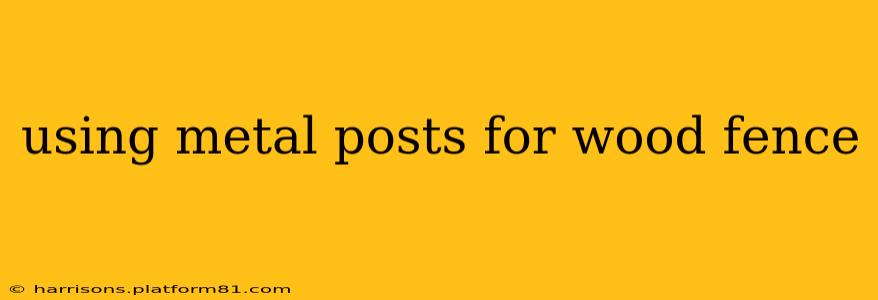Building a wood fence is a significant undertaking, and choosing the right posts is crucial for longevity and stability. Metal posts are increasingly popular due to their durability and resistance to rot and insect damage compared to traditional wood posts. This guide will explore the advantages, disadvantages, and practical aspects of using metal posts for your wood fence.
Why Choose Metal Fence Posts?
Metal fence posts, typically made of steel or aluminum, offer several key advantages over their wooden counterparts:
-
Durability and Longevity: Metal posts are significantly more resistant to rot, insect infestation, and weather damage. This translates to a longer lifespan for your fence, saving you money and hassle in the long run. They can withstand harsh weather conditions and maintain their structural integrity for decades.
-
Strength and Stability: Metal posts provide superior strength and stability, especially in challenging soil conditions. They can better withstand strong winds and heavy snow loads. This is particularly important in areas prone to extreme weather events.
-
Low Maintenance: Unlike wooden posts, metal posts require minimal maintenance. They don't need to be treated, stained, or replaced due to rot or insect damage. A simple cleaning occasionally is usually sufficient.
-
Consistent Sizing and Straightness: Metal posts are manufactured to precise dimensions, ensuring consistent spacing and a straighter fence line compared to naturally occurring variations in wooden posts.
What are the Disadvantages of Metal Fence Posts?
While metal posts offer numerous benefits, it's important to consider their limitations:
-
Cost: Metal posts are generally more expensive upfront than pressure-treated wooden posts. However, their longer lifespan often offsets this initial cost over time.
-
Rust and Corrosion: Steel posts are susceptible to rust and corrosion, especially in humid or salty environments. Aluminum posts are more resistant to corrosion but can be more expensive. Proper galvanization or powder coating can mitigate this risk.
-
Installation Challenges: Installing metal posts can be more challenging than setting wooden posts, particularly in rocky or hard soil. Specialized tools may be required.
-
Heat Conductivity: Metal posts can get hot in direct sunlight, which might be a consideration in certain climates or if you are concerned about touching the posts.
What Types of Metal Posts are Available?
Several types of metal posts cater to different needs and budgets:
-
Steel Posts: Common and relatively inexpensive, steel posts offer excellent strength. Look for galvanized or powder-coated options to prevent rust.
-
Aluminum Posts: More expensive than steel but highly resistant to corrosion, aluminum posts are ideal for coastal areas or environments with high humidity.
-
Wrought Iron Posts: These offer an elegant, decorative look, but are generally more expensive and require specialized installation.
How to Install Metal Fence Posts?
Proper installation is crucial for the longevity and stability of your metal post fence. This generally involves:
- Planning and Layout: Accurately measure and mark the post locations, ensuring proper spacing.
- Digging Post Holes: Use a post hole digger to excavate holes to the required depth (usually 3-4 feet deep, depending on post height and soil conditions).
- Setting the Posts: Place the metal posts in the holes, ensuring they are plumb (perfectly vertical).
- Backfilling: Compact the soil around the posts to provide firm support. Consider using concrete for added stability in unstable soil conditions.
What Kind of Metal Posts are Best for a Wood Fence?
The best metal post for your wood fence depends on several factors including your budget, climate, and soil conditions. Galvanized steel is a popular and cost-effective choice, while aluminum offers superior corrosion resistance.
Are Metal Fence Posts Better Than Wood?
Metal and wood posts each have their pros and cons. Metal posts generally offer greater longevity and require less maintenance, while wood posts are often less expensive upfront. The best choice depends on your individual circumstances and priorities.
How Long Do Metal Fence Posts Last?
With proper installation and care, metal fence posts can last for 20-30 years or even longer. This significantly exceeds the lifespan of most wooden posts.
How Much Do Metal Fence Posts Cost?
The cost of metal fence posts varies depending on the type of metal, size, and finish. Expect to pay more for aluminum posts and powder-coated finishes compared to basic galvanized steel posts.
This comprehensive guide provides a solid foundation for understanding the benefits, drawbacks, and practical considerations of using metal posts for your wood fence. Remember to consult local building codes and consider seeking professional assistance if you are unsure about any aspect of the installation process.
